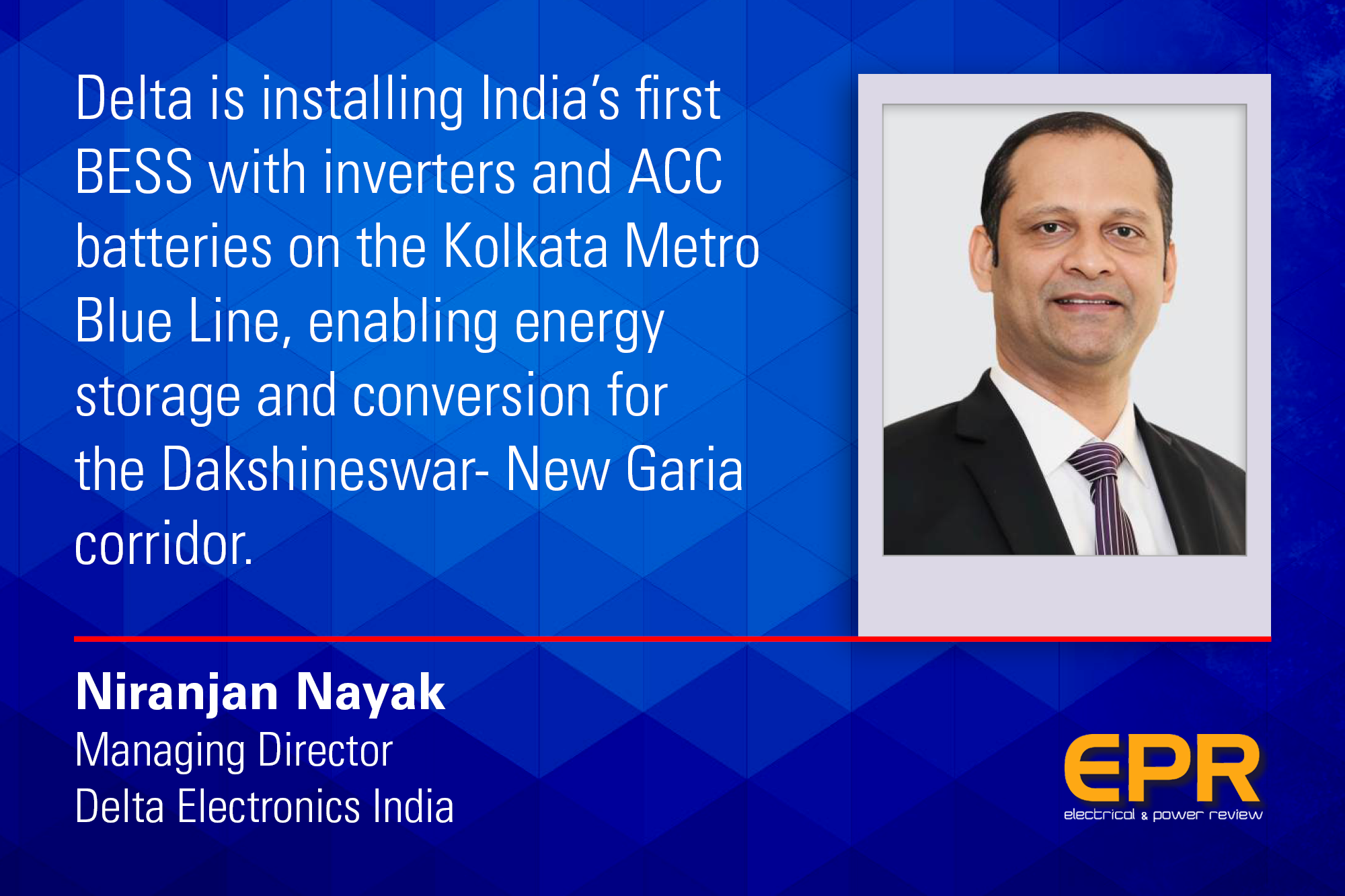Delta Installs India’s First BESS with ACC Batteries on Kolkata Metro Blue Line
By Staff Report September 25, 2024 5:40 pm IST
By Staff Report September 25, 2024 5:40 pm IST

Delta Electronics India is dedicated to meeting the country’s energy storage needs by advancing renewable energy integration. Enhancing grid stability through innovative Battery Energy Storage Systems and smart energy management solutions is on the cards.
Industrialist Niranjan Nayak explains more about the industry and the company in talks with the EPR Magazine.
How does BESS by Delta enhance energy storage capabilities in India?
Delta Electronics India is fully committed to supporting India’s growing energy storage needs, particularly as it advances toward its renewable energy and sustainability goals. We recognise Battery Energy Storage Systems (BESS) ‘s critical role in stabilising the grid, enhancing energy efficiency, and promoting the integration of renewable energy sources.
The lithium battery energy storage system (BESS) by Delta offers high energy density, advanced battery management, and multi-level safety protection. Housed in a modular cabinet, it meets international standards across Europe, America, and Japan, ensuring global reliability and safety. A notable example is our project with Kolkata Metro, where Delta is installing BESS in the Dakshineswar-New Garia corridor (Blue Line). This system, the first in India, integrates inverters and Advanced Chemistry Cell (ACC) batteries, which store and convert energy as needed. Designed to ensure passenger safety, it will allow trains to travel 30 km/h to the next station in case of power failures, reducing disruption and enhancing operational efficiency.
As India is projected to add 1.6 GWh of BESS by 2027, Delta can contribute through scalable, sustainable solutions while expanding partnerships across industrial, commercial, and utility-scale applications to drive the renewable energy transition.
How does the energy storage system improve grid stability and energy efficiency?
Technological advancements in energy storage systems (ESS) significantly improve how we manage energy efficiency and grid reliability. At Delta, we focus on developing solutions that support a wide range of applications, from power generation and distribution to industrial and commercial uses. These advancements allow energy storage systems to stabilise the grid, particularly by balancing power between renewable energy sources, conventional generation, and consumption, helping to smooth out fluctuations and address supply-demand challenges.
ESS can provide benefits for industries and commercial buildings, such as peak shaving and load shifting, and it ensures backup power during outages. These technologies also play an essential role in enhancing the integration of renewable energy, making power grids more resilient and efficient. By incorporating bi-directional power conditioning, advanced battery management, and energy control systems, ESS solutions can support the diverse needs of different sectors.With capacities ranging from 100kW to 3.7MW, Delta’s systems offer flexibility for applications like renewable power plants, factories, EV charging stations, and microgrids. The goal is to contribute to a more sustainable and reliable energy infrastructure, leveraging energy storage to manage demand more effectively and improve grid stability.
How does DeltaGrid improve energy infrastructure efficiency using AIoT?
DeltaGrid is integral to our approach to optimising energy infrastructure. It serves as the central platform for managing and improving the efficiency of our energy systems. By leveraging AIoT technology, DeltaGrid supports seamless integration with photovoltaic systems, energy storage solutions, and EV chargers. This integration allows us to effectively enhance energy management, regulate power distribution, and monitor carbon emissions.
We take security seriously, and DeltaGrid meets the IEC 62443-3-3 Industrial IoT security standard, ensuring that our systems are protected against potential threats. The platform also includes a suite of communication and control tools, such as modules for smart meters and street lights and gateways for managing solar power plants.
In addition to the core system, DeltaGrid offers specific solutions, such as DeltaGrid EVM for EV charging, DeltaGrid EM for energy storage and renewable energy management, DeltaGrid Metering for smart meter connectivity, and DeltaGrid O&M for operation and maintenance services. These components collectively enhance our ability to monitor and manage energy infrastructure, supporting more efficient and reliable operations.
We use cookies to personalize your experience. By continuing to visit this website you agree to our Terms & Conditions, Privacy Policy and Cookie Policy.